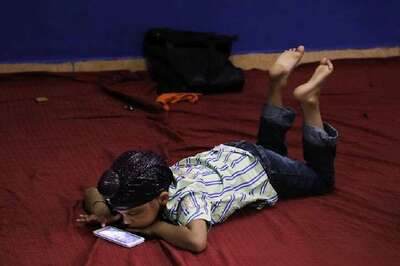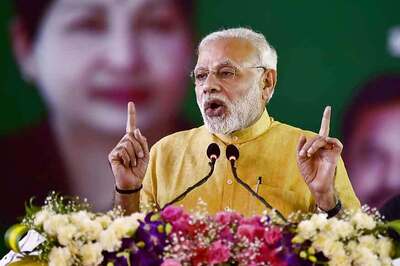
views
Will actress Kareena Kapoor Khan follow in the footsteps of her late father-in-law Mansoor Ali Khan ‘Tiger’ Pataudi and dabble in politics?
Kareena’s name has been proposed by two Congress leaders, Guddu Chouhan and Anas Khan, as a possible candidate for Bhopal parliamentary seat where the grand old party has not tasted success since 1984.
There is no word from either Kareena or Madhya Pradesh Chief Minister and senior Congress leader Kamal Nath if the suggestion is under active consideration.
While Pataudis hail from Pataudi town near Gurgaon, their Bhopal link was established three generations ago when Nawab Iftekhar Ali Khan Pataudi married Begum Sajida Sultan. Begum Sajida Sultan (actor Saif Ali Khan’s grandmother) was the second daughter of Hamidullah Khan, the Nawab of Bhopal and last regent of Bhopal State.
In 1991, when Rajiv Gandhi was desperately seeking a return to power, ‘Tiger’ Pataudi had donned political colours. Pataudi’s political turf was Bhopal, a rich princely state had had lost close to Rs 11,000,00 when Indira Gandhi abolished privy purses.
Rajiv Gandhi was reasonably sure of Pataudi’s success as the Nawabs of Bhopal were a popular figure, having given huge land to the poor. After Sajida Sultan’s death, Pataudi had himself become chief ‘muttawalli’ (custodian) of several mosques, dargahs, graveyards and other shrines (worth over Rs 1,000 crore as per new estimates). After his death in 2011, Saif’s sister Saba Ali Khan, a jewellery designer, became his successor. Till date, Saba continues to be the ‘chief muttawalli’ of numerous Waqf properties.
However, the 1991 Bhopal election proved to be an anti-climax of sorts for the Pataudi family and the Congress. A few days into the campaign, Pataudi and his wife, actress Sharmila Tagore, who had emerged as a key campaigner, discovered that it was a city divided sharply on communal lines. The cricketer was never comfortable donning the skull cap and projecting himself as a devout Muslim.
At the same time, he could never hide his preference for secular polity. While both he and Sharmila drew huge crowds, Rajiv Gandhi flew down to Bhopal to campaign for him a few days before his tragic end and a section of the Congress conspired against the party’s official nominee. The calculations were that Pataudi’s success would seal the doors for locals for next two decades. Moreover, in Pataudi, Rajiv Gandhi would have a trusted man in Bhopal to keep a check on ambitious and maverick politicians like Arjun Singh, Shyama Charan Shukla, Madhavrao Scindia and others.
Incidentally, it was Tiger Pataudi’s second electoral defeat. When Indira Gandhi had abolished privy purses in 1970, the young Nawab of Pataudi’s loss was paltry Rs 48,000 a year, but he chose to take on the mighty Indira Gandhi. In 1971, the charming cricketer contested the Lok Sabha elections from Gurgaon to seek the voters’ mandate against “breach of trust”.
The privy purse was a payment made to the royal families of erstwhile princely states as part of their agreements to first integrate with India in 1947, and later to merge their states in 1949 whereby they lost all ruling rights. In addition to privileges such as gun-salutes and titles, about a Rs 100 crore tax-free money was paid to 565 former royals.
As a nominee of the Vishal Haryana Party, Pataudi got less than 5 percent of the votes. The issue of taking away the perks and privileges of former rulers was considered as ‘controversial’ by many within the Congress too. Indira’s own finance minister, Morarji Desai, had earlier opposed it on the grounds that it would be unethical for a Congress government to break the agreement. However, for Indira, more than the issue of money, the very idea that some people enjoyed a life of such luxury out of their “fabulous, unearned and untaxed purses” was abhorrent.
When the bill abolishing the privy purse was moved in Parliament, Indira Gandhi had urged members to vote “in accordance with the spirit of times”. She admitted that while the abolition of the privy purse might not solve perennial problems of poverty and unemployment, it was still a “step in the particular direction in which the country wants to go and will go in spite of anybody”. “If we do not take it, we will be swept aside,” she said.
The 1971 electoral battle and defeat did not affect Pataudi’s ties with the Nehru-Gandhi family. Like the 1971 verdict in Gurgaon, the electoral defeat in Bhopal in 1991 had not lessoned peoples’ affection towards Pataudi family. The big question is whether Congress chief Rahul Gandhi will walk the extra mile to convince close family friends Saif Ali Khan and Sharmila Tagore, and the Kapoor khandan to let Kareena contest the 2019 Lok Sabha polls from Bhopal.
2019 is set to witness a large, rather unprecedented number of film and sports personalities in the electoral fray. The BJP, under prime minister Narendra Modi and party chief Amit Shah, is said to have lined up a formidable list of candidates, including Madhuri Dixit, Gautam Gambhir, Sunny Deol, Ajay Devgn, Kapil Dev, Akshay Kumar and Anupam Kher in addition of its existing line-up of Paresh Rawal, Hema Malini, Manoj Tiwari and Babul Supriyo. Can Kareena Kapoor be Congress’ answer to them?
(The author is visiting fellow at the Observer Research Foundation and a journalist. Views are personal)




















Comments
0 comment